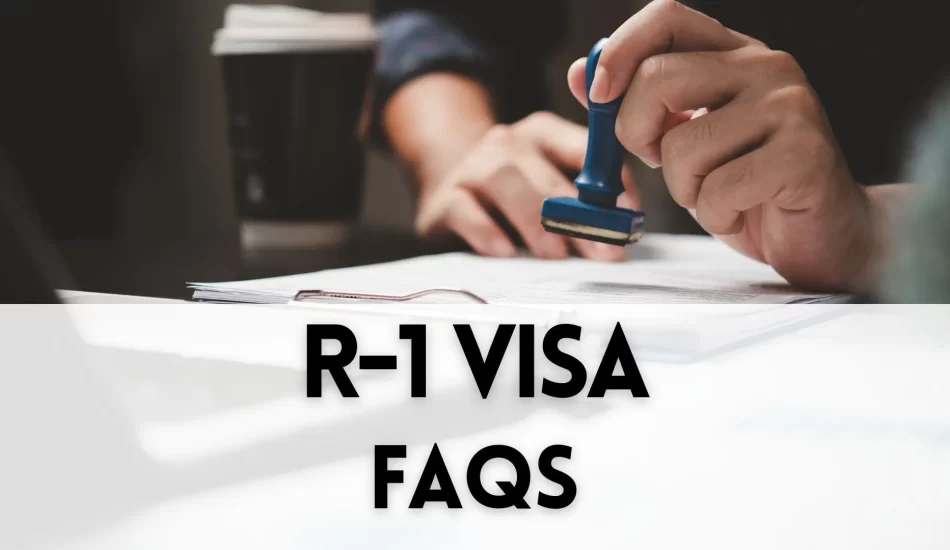R-1 Visa: Your Questions Answered

If you are coming to the U.S. to be employed either as a minister or in another religious vocation/occupation by a non-profit religious organization, you may qualify for an R-1 visa. The R-1 visa program is intended for ministers or religious workers whose lives are dedicated to religious practices and functions, and it is not appropriate for secular members of the religion.
What positions are available to work at on an R-1 visa?
The R-1 visa is designed for religious workers who wish to come to the United States temporarily to work in a religious capacity. According to the U.S. Citizenship and Immigration Services (USCIS), the following positions are typically considered to be “religious occupations” that may be eligible for an R-1 visa:
- Clergy members, including pastors, ministers, priests, and rabbis
- Religious instructors or counselors, who provide religious instruction or guidance to members of the denomination
- Liturgical workers, such as altar servers, cantors, and choir members
- Religious broadcasters, who produce and/or broadcast religious programming
- Religious translators, who translate religious texts or instructions for the denomination
In general, the job duties of an R-1 visa holder must be primarily focused on religious work, and the individual must be affiliated with a qualifying non-profit religious organization in the United States.
It’s important to note that the eligibility criteria for R-1 visas can be complex, and it’s often best to seek the advice of an immigration attorney or other immigration expert to determine whether your particular job or role may qualify for this type of visa.
What are the main reasons R-1 visa applications get denied?
There are several reasons why an R-1 visa application may be denied by the U.S. Citizenship and Immigration Services (USCIS). Some of the most common reasons include:
Lack of qualifying religious work
To be eligible for an R-1 visa, the individual must be coming to the United States to work in a religious capacity. If the USCIS determines that the job duties are not primarily focused on religious work or that the individual is not affiliated with a qualifying religious organization, the visa may be denied.
Inadequate documentation
The USCIS requires extensive documentation to support an R-1 visa application, including evidence of the individual’s religious qualifications, the nature of the religious organization, and the job duties and responsibilities. If the documentation is incomplete, inconsistent, or inadequate, the visa may be denied.
Prior immigration violations
If the individual has previously violated U.S. immigration laws or has been deported, the visa application may be denied.
Security concerns
If the USCIS determines that the individual poses a security risk to the United States, the visa application may be denied.
Ineligibility due to length of stay
The R-1 visa is typically issued for a period of up to three years, with the possibility of a one-time extension for an additional two years. If the USCIS determines that the individual’s intended stay in the United States is longer than the maximum allowed under the R-1 visa program, the visa application may be denied.
It’s important to note that the USCIS has broad discretion to approve or deny visa applications, and the specific reasons for a denial can vary depending on the individual circumstances of each case. If your R-1 visa application is denied, you may have the option to file an appeal or a motion to reopen or reconsider the decision.
Who can apply for an R-1 visa?
The R-1 visa is a nonimmigrant visa that is available to foreign nationals who wish to come to the United States temporarily to work in a religious capacity. To be eligible for an R-1 visa, the individual must meet the following requirements:
Be a member of a religious denomination: The individual must be a member of a religious denomination that has a non-profit religious organization in the United States.
Be coming to the United States to work in a religious capacity: The individual must be coming to the United States to work in a religious capacity, either as a minister or in another religious vocation or occupation. The religious work must be the primary purpose of the individual’s stay in the United States.
Have been a member of the religious denomination for at least two years: The individual must have been a member of the religious denomination for at least two years immediately prior to applying for the R-1 visa.
Have a job offer from a qualifying religious organization: The individual must have a job offer from a qualifying non-profit religious organization in the United States.
Have the necessary qualifications: The individual must have the necessary qualifications, such as education, training, and experience, to perform the job duties in the religious occupation.
It’s important to note that the R-1 visa is not available to foreign nationals who are coming to the United States to work in secular occupations, even if the employer is a religious organization. Additionally, the R-1 visa is a temporary visa, and the individual must intend to return to his or her home country at the end of the authorized stay in the United States.
